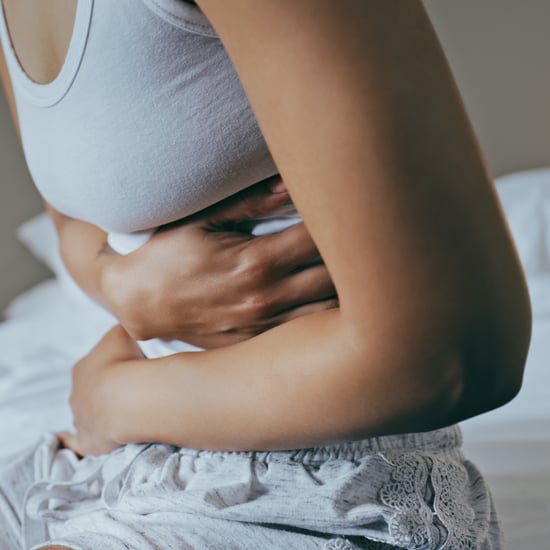What Causes Digestive Issues During Menstrual Period?
Why Digestion Is Messed Up During Your Period
It's beyond rough when you suffer from digestive issues during your period. To help answer a reader's question on this matter, we turned to a board-certified physician who practices in southern California for her expert advice.

Dear Doctor,
I am wondering why my digestion goes haywire during my menstrual period. I always keep my diet clean and exercise daily, but I can't seem to combat the gas, diarrhoea, constipation, and constant gurgly noises coming from my gut! What could this be and how can I stop it?
Oh, what fun menstruation is! It's our monthly reminder that we are capable of reproducing, which is a beautiful thing! But, unfortunately, it brings with it some not-so-fun symptoms, including the ones you've listed: gas/bloating, diarrhoea, and constipation. The most straightforward answer for your question is that these symptoms you have are due to hormones and chemicals!
The intricate balance of hormones and chemicals is what allows ovulation and menstruation to take place. Oestrogen is the hormone that is important in preparing the egg for ovulation. According to MedicineNet.com, it is the progesterone, and to a lesser extent oestrogen, that is the culprit for a few of the symptoms you have. Progesterone is the hormone that increases immediately after ovulation and decreases slowly until its levels drop enough to trigger menstruation. The main symptoms that progesterone (and oestrogen) cause are bloating, gas, and constipation. This is secondary to the slowing or quieting effect on the contractility of the smooth muscle of the digestive tract that progesterone causes.
Related: Here's How to Relieve Period-Related Back Pain
Once menstruation is triggered, chemicals called prostaglandins are released. Everyday Health explains that prostaglandins are important in that they cause the uterus to contract to slough off the uterine lining during menstruation. Prostaglandins, especially if present in excess, can lead to uterine cramping and discomfort that some women experience during their menstrual period. In a published study on prostaglandins and the menstrual cycle, prostaglandin levels measured in women during their periods showed that women with diarrhoea had higher levels of prostaglandins in their system. Thus, it is possible that higher or excess levels of prostaglandins could be the cause of the diarrhoea and gurgly noises you experience during your period, as they cause increased contraction and motility of the smooth muscle of the digestive tract.
Typically, most women experience constipation prior to their menstrual period and this resolves within the first few days of menstruation. Also, according to Everyday Health, generally speaking, women who experience diarrhoea during their menstrual cycle typically get it once menstruation has started and it usually occurs in the first three days of your menstrual period. However, all women are different in terms of the levels of hormones they have, and thus, different women can experience different symptoms at different times during their menstrual cycle.
Related: Skip the Ibuprofen and Do These Yoga Poses For Menstrual Cramp Relief
Another study found that women with irritable bowel syndrome (IBS) are more likely to experience digestive disturbances during their menstrual periods compared to women without chronic bowel problems. Not all women who experience gastrointestinal problems during menstruation have IBS, but it's something to talk to your physician about if your symptoms are extreme. Anytime your symptoms are extreme, or you are experiencing significant pain or bloody stools, you should consult with your physician for further workup and treatment.
There are many things that can be done in the premenstrual and menstrual period to try and alleviate your symptoms. You can alter your diet to include lots of high-fibre foods, whole grains, and vegetables, and limit intake of extra salt, dairy, sugar, alcohol, spicy foods, and caffeine. You can manage or decrease stress by using relaxation techniques such as yoga or meditation or by talking with someone. Regular exercise is also recommended during your premenstrual and menstrual period, which can help reduce stress and help your digestive system function more smoothly. Keeping a diary of your GI symptoms prior to and during your period may help you identify patterns with symptoms and food/exercise/behaviours and then a plan can be developed to optimise or avoid certain things during these times to minimise symptoms. Some people's menstrual symptoms may improve by taking medications such as ibuprofen or naproxen (non-steroidal anti-inflammatory drugs or NSAIDs) that decrease prostaglandin levels. These medications are relatively well tolerated with short-term use, although they can upset the stomach and are best taken with a small amount of food. Contraindications to use of NSAIDs include: pregnancy, history of stomach or intestinal ulcers, asthma, bleeding abnormalities, and history of allergy to this type of drug. For more information on whether this type of medication is safe for you to take, you should consult your GP.
DrSugar's posts are for informational purposes only and should not be considered medical advice, diagnosis, or treatment recommendations. Click here for more details.






